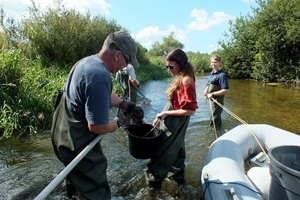 3 minute read
3 minute read
New research investigating the influence of temperature and flood events on juvenile Atlantic salmon found that warmer winters and cooler springs could be driving a fall in their numbers. Experts from the Game & Wildlife Conservation Trust (GWCT) studied the River Frome in Dorset and found numbers of juveniles were lower following unseasonal temperatures, which could be associated with climate change. Their findings highlight the fragility of chalk streams, and the salmon populations that inhabit them, to such changes in climate.
Atlantic salmon stocks have suffered declines throughout their range in recent decades, leading researchers to pursue a better understanding of their threats in both their juvenile freshwater and adult marine habitats. With this understanding, freshwater habitats could be managed to produce lots of large juvenile salmon with the best chance of surviving their marine journey to return to their natal river to spawn.
Most juvenile salmon monitoring programmes nationally were cancelled in 2020 due to the COVID-19 pandemic. Under strict health and safety protocols, the GWCT was able to coordinate and undertake its long-term monitoring of juvenile salmon in the River Frome successfully in autumn. This 2020 survey recorded low numbers of juvenile salmon, second lowest only to the widespread juvenile salmon crash in 2016.
In the River Frome, adult salmon spawn and lay eggs in spawning gravels (redds) during winter and salmon fry emerge from redds during spring. Both the 2016 and 2020 autumn juvenile sampling followed unusually mild and wet winter conditions, and in 2016 in particular, spring temperatures were unseasonably cold.
Dr Jessica Marsh, who led this research for the GWCT, said: “Our findings highlight that changes to seasonal temperatures in chalk streams – groundwater-fed rivers that are considered relatively stable in their thermal regime compared to more dynamic rain-fed rivers – can have detrimental impacts on juvenile salmon recruitment in these systems.”
Recent research led by the GWCT found that warmer winters and wetter spring conditions contributed to lower numbers of juvenile salmon in numerous Welsh rivers. In a new study, funded by EU’s Interreg Channel VA Programme and the Missing Salmon Alliance and recently published in the Journal of Fish Biology, we aimed to identify whether findings from the rain-fed Welsh rivers, which are subject to relatively large fluctuations in temperature and river flow, could be generalised to a relatively benign groundwater-fed chalk stream, the River Frome.
Dr Stephen Gregory, a GWCT Fisheries Scientist who contributed to both studies, added: “That findings from Welsh rivers also applied to a southern English chalk stream suggests that the effects of unusual weather conditions are more widespread than we first thought, and could therefore be usefully incorporated into future salmon recruitment models.”
This study, led by the GWCT and Centre for Environment, Fisheries and Aquaculture Sciences (Cefas), used data on juvenile (young-of-the-year) salmon collected at multiple sites throughout the River Frome catchment from 2015 to 2020. It found that a combination of warm winters and cool springs had a negative influence on the numbers of juvenile salmon, and suggests that these factors could, in part, explain the crashes of 2016 and 2020. Flood events did not exert a large influence on numbers of juveniles, possibly because they occurred infrequently and at a low magnitude relative to the rain-fed Welsh rivers.
Warmer temperatures during spawning in winter could disrupt adult spawning behaviour or egg development, and cool temperatures during fry emergence in spring could reduce feeding and growth opportunities, and ultimately survival.
Notes to editors
The Game & Wildlife Conservation Trust – providing research-led conservation for a thriving countryside. The GWCT is an independent wildlife conservation charity which has carried out scientific research into Britain’s game and wildlife since the 1930s. We advise farmers and landowners on improving wildlife habitats. We employ more than 60 post-doctoral scientists and other research staff with expertise in areas such as birds, insects, mammals, farming, fish and statistics. We undertake our own research as well as projects funded by contract and grant-aid from government and private bodies.
For information, contact:
Eleanor Williams
Telephone: 07592 025476
Email: press@gwct.org.uk